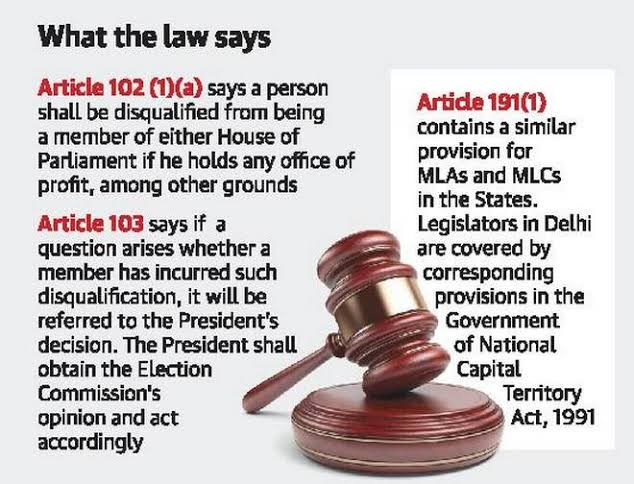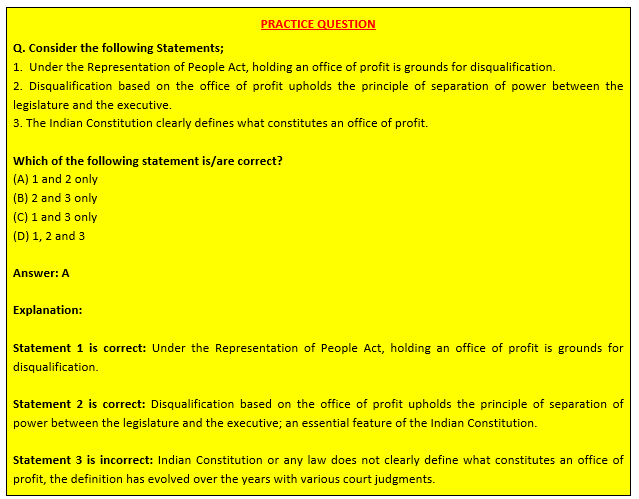Description

Copyright infringement not intended
In News
- The Governor of Jharkhand was recently appointed as the Governor of Maharashtra.
- The Governor left the Raj Bhavan in Ranchi without disclosing the Election Commission’s opinion on whether the current Chief Minister of Jharkhand should be disqualified for allegedly allocating a mining lease to himself when he was the mining and forest minister of Jharkhand.
- The Governor maintained silence on the EC’s opinion for more than five months since August 2022.
- The EC’s communication to the Governor is confidential, but information from unofficial sources widely believed that the EC had recommended the disqualification of the Chief Minister of Jharkhand.
- However if the Governor had acted upon the EC recommendation, it would have led to immediate political instability in Jharkhand.
- It is now up to the new Governor of Jharkhand to act on the EC’s opinion in this matter.
Allegations against the Chief Minister
- In February 2022, the Opposition parties accused the Chief Minister of Jharkhand of “misusing his post” to get “in-principle approval” for a stone quarrying lease.
- He violates the provisions of The Representation of the People Act, of 1951 and the Prevention of Corruption Act, of 1988.
- Opposition parties filed a petition in the Jharkhand High Court to prosecute the CM. The court defined the allegations as serious and asked the government to file a response.
- The Jharkhand government admitted that it had committed “a mistake”, and after that, the Chief Minister had “disassociated himself from by surrendering the lease in November 2022.
Under which law the matter was referred to the Election Commission?
- Articles 191 and 192 of the Indian Constitution deal with “Disqualifications for membership” of a state Legislative Assembly or Council, and “Decision on questions as to disqualifications of members” respectively.
- Article 191(1) expresses that “a person shall be disqualified for being chosen as, and for being, a member” of a state House “if he holds any office of profit under the Government of India or the Government of any State…, other than an office declared by the Legislature…not to disqualify its holder”.
- Article 192(1) says that if “any question arises as to whether a member…has become subject to…disqualification…, the question shall be referred for the decision of the Governor and his decision shall be final”.
- Under Article 192(2), “Before giving any decision on any such question, the Governor shall obtain the opinion of the Election Commission and shall act according to such opinion.”
.jpeg)
What was the Election Commission's opinion on this matter
- In August 2022, the Commission sent its opinion to the Governor in a sealed envelope. The opinion is not in the public domain.
- Sources have claimed that the Commission recommended the “disqualification” of the CM from the membership of the Jharkhand House.
- However, despite repeated demands to disclose the EC’s recommendation, the Governor declined to make the EC’s opinion public or to act on it.
Is the Governor bound to act on the EC’s recommendation?
- Article 192(2) of the Indian Constitution says that the Governor “shall act” according to the EC’s opinion.
- However, it does not lay down a time frame for the Governor to act.
Office of Profit
- Members of Parliament (MPs) and Members of the Legislative Assembly (MLA), as members of the legislature, hold the government accountable for its work.
- Under the Representation of People Act, holding an office of profit is grounds for disqualification.
- The rationality behind the disqualification under the office of profit law is that if legislators hold an ‘office of profit’ under the government, they might influence the government, and may not discharge their constitutional duty.
- Disqualification under “office of profit” ensures that there should be no conflict between the duties and interests of an elected member.
- Disqualification based on the office of profit upholds the principle of separation of power between the legislature and the executive; an essential feature of the Indian Constitution.
- Under Article 102 (1) and Article 191 (1) of the Indian Constitution, an MP or an MLA (or an MLC) is barred from holding any office of profit under the central or state government, but Indian Constitution or any law does not clearly define what constitutes an office of profit, the definition has evolved over the years with various court judgments.
- An office of profit is defined as a position that brings to the officeholder some financial gain, advantage, or benefit.
- The Supreme Court ruled that Several questions need to be considered in deciding the matter of office of profit:
- Whether the government is the appointing authority.
- Whether the government has the power to terminate the appointment.
- Whether the government determines the remuneration.
- What is the source of remuneration?
- The power that comes with the position.
Other reasons for the Disqualification of the member
- If he holds any office of profit under the Union or state government.
- If he is of unsound mind and stands so declared by a court.
- If he is an undercharged insolvent.
- If he is not a citizen of India or has voluntarily acquired the citizenship of a foreign state or is under any acknowledgement of allegiance to a foreign state.
- If he is so disqualified under any law made by Parliament.
- The Parliament has prescribed several additional disqualifications in the Representation of People Act (1951).
- He must not have been found guilty of certain election offences or corrupt practices in the elections.
- He must not have been convicted for any offence resulting in imprisonment for two or more years. But, the detention of a person under a preventive detention law is not a disqualification.
- He must not have failed to lodge an account of his election expenses within the time.
- He must not have any interest in government contracts, works or services.
- He must not be a director or managing agent nor hold an office of profit in a corporation in which the government has at least a 25% share.
- He must not have been dismissed from government service for corruption or disloyalty to the state.
- He must not have been convicted for promoting enmity between different groups or for the offence of bribery.
- He must not have been punished for preaching and practising social crimes such as untouchability, dowry and sati.
- To decide whether a member has become subject to any of the above disqualifications, the governor’s decision is final.
- However, Governor should obtain the opinion of the Election Commission and act accordingly.
- Indian Constitution also lays down that a person shall be disqualified from being a member of either House of state legislature if he is so disqualified on the ground of defection under the provisions of the 10th Schedule.
- The question of disqualification under the 10th Schedule is decided by the Chairman, in the case of the legislative council and, the Speaker, in the case of the legislative assembly (and not by the governor).
- The decision of the Chairman/Speaker is subject to judicial review.

Way forward
- In modern polity, the concept of separation of power becomes too thin because the government function becomes so wide that the government can't work in its limited power which is given to the government.
- We must bear in mind the objective of the disqualification under ‘the office of profit’ is to avoid conflict between the different branches of the state.
- The need of the hour is to enact a comprehensive national law to clearly define the ‘office of profit’.


https://indianexpress.com/article/explained/explained-politics/jharkhand-cm-hemant-soren-office-of-profit-case-governor-ramesh-bais-8443017/












